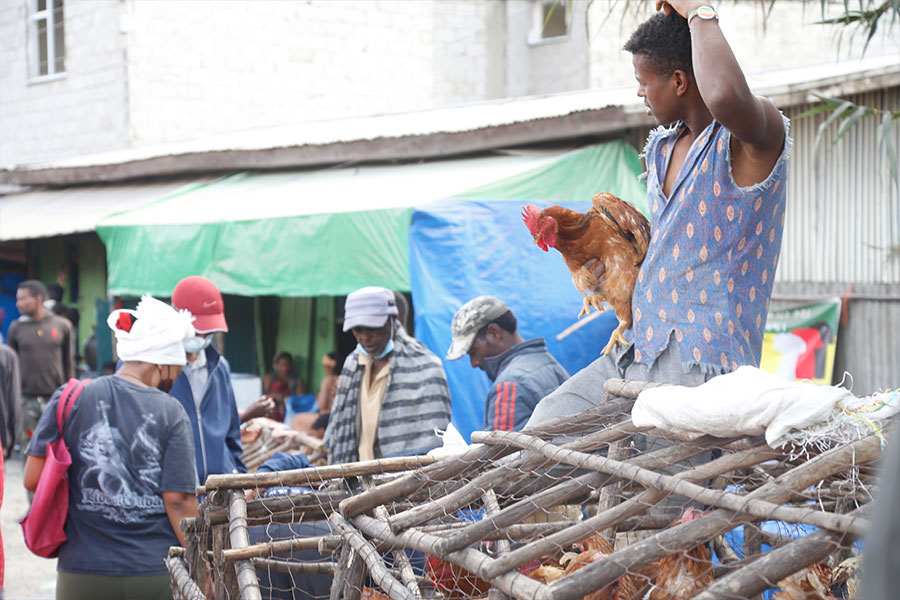
Commentaries | Apr 10,2023
Feb 1 , 2019
The toddler is inconsolable, irate that he be fed immediately and insistent on removing the delicate netela, white shawl, that his mother modestly tries to cover her body with. The child grapples at the fabric with a fury; it attacks with his inward-curled palms; kicks away at the shawl with tiny knuckles and legs; and scowls, screws and twists his little mouth, pushing his eyes and cheeks to reach his mother’s milk. She finally relents and surrenders to the infant.
The little figure draws close to her embrace and nurses greedily, sinking into a state of bliss that seems to feed both his hunger and his emotions. The mother looks out the window of a packed bus where she sits next to the isle and gazes sideways through a window where vehicles, carts, pedestrians and taxis jostle for positions on the overcrowded street.
The passengers, mostly middle-aged men and women, and a smattering of young squawking youth, seem to be utterly oblivious of the breastfeeding mother sitting among them. There are no murmurs of disapproval, talk of retribution nor shaming, or even a disapproving glance thrown at the two delicately intertwined figures - the Litta Madonna of Leonardo da Vinci.
Accounts of mothers being shamed for publicly breastfeeding their toddlers in modern cities across the globe are not uncommon. These accounts are not confined to the West. There are reports of protests coming from Hong Kong, Argentina and even from neighbouring Kenya against women who nurse their children in public.
There is a recent story of a Utah woman in the United States who is reprimanded that her open breastfeeding is “a modesty issue,” according to Buzzfeed. The mother was reportedly told by her cleric that a woman's modesty is necessary "so that men don't have dirty thoughts."
In Ethiopia, the presence of a nursing mother in the cramped confines of a dirty crowded bus is just a mere fact of life. This contrasts with the West’s confused morality that unwittingly imposes incredulous bounds to the vastness and harmony of creation. A nursing mother and a suckling infant anywhere in the public sphere should arouse no controversy; nor any questions of morality, immodesty or otherwise be considered any different than a queen cat nursing its kittens.
Ethiopians, steeped in ancient cultures and religions, can teach the rest of the world a thing or two about morality. A recent American visitor, for instance, was puzzled to see two middle-aged men in suits walking into a hotel lobby hand in hand. The men proceeded to hold each other’s hands as they approached another colleague who joined them at a table where the affectionate physical exchanges continued with the occasional pats and caresses.
Men and women across the country show unfettered affection to one another without the connotation of sexuality or morality, which has obliterated natural human interactions in the Western world. As the United States and other rich countries grapple with these issues, Ethiopians march on with little concern or awareness that the public display of affection between the sexes or public breastfeeding has any bearing on the question of morality and sexuality.
Breastfeeding and public displays of affection are seldom, if at all, discussed as a civic issue in Ethiopia. Questions of morality are deeply personal here and are rarely raised as an issue of social liberalism, political stance or legal position; nor are they discussed in the public sphere or become topics of discussion at family dinners.
This is one of the reasons that the nation, as conservative as it is, has thus far escaped the quagmire of the divisive issue of abortion rights. While countless women around the world are forced to deal with the morality and legality of abortion, Ethiopians simply sail on and leave the matter to the women and the clinics. Even the 2005 Abortion Law seems to be more “honoured in the breach than in the observance.”
On the other side of the globe, however, the United States struggles with abortion despite numerous laws and has waded into the quicksand of legal decisions that have granted states the power to regulate abortion. The result is that some states engage in restricting abortions to such an extent that they have effectively banned it.
As for breastfeeding in the West, scholarly research is conducted, support groups are organised, laws are enacted and opinions are narrated ad nausea in the media, while mothers are known to be thrown out of public spaces for nursing their babies.
In the West, whenever this issue arises it is greeted with passionate responses, inflammatory comments and questions of propriety, decency and morality. Here, it is a muted topic which elicits nary a notice whether it takes place in a crowded city bus or a boutique café.
It is refreshing to observe that the sexual aspects of breastfeeding have escaped Ethiopia, and a “wholly modest and private world of infant suckling,” as the Conversation Magazine put it in 2016, would be an alien notion to the citizens.
In Ethiopia, the cultural norms are simple and hold individuals responsible for their own morality and decency. Nothing is expected of the toddler’s mother in the crowded bus than what her own modesty dictates to her. The society at large does not entangle itself on how individuals should handle themselves in matters of decency and morality that touch upon human nature.
Ethiopians, unique in many aspects of their lives, are way ahead of the rest of the world in their advanced outlook toward these sticky issues. Morality in Ethiopia is the individual’s contribution to society; and decency, the practical and cohesive cog that keeps it glued together. These elements together safeguard the welfare of the community, but they are not the primary reason for its existence.
PUBLISHED ON
Feb 01,2019 [ VOL
19 , NO
979]


Commentaries | Apr 10,2023

View From Arada | Sep 17,2022

Fortune News | Jan 30,2021

Life Matters | Dec 17,2022

Agenda | Jan 07,2022

Fortune News | Mar 09,2020

Life Matters | Feb 06,2021

Sunday with Eden | Jan 12,2019

Featured | Sep 08,2019

Sunday with Eden | Aug 31,2019

Dec 22 , 2024 . By TIZITA SHEWAFERAW
Charged with transforming colossal state-owned enterprises into modern and competitiv...

Aug 18 , 2024 . By AKSAH ITALO
Although predictable Yonas Zerihun's job in the ride-hailing service is not immune to...

Jul 28 , 2024 . By TIZITA SHEWAFERAW
Unhabitual, perhaps too many, Samuel Gebreyohannes, 38, used to occasionally enjoy a couple of beers at breakfast. However, he recently swit...

Jul 13 , 2024 . By AKSAH ITALO
Investors who rely on tractors, trucks, and field vehicles for commuting, transporting commodities, and f...

Oct 25 , 2025
The regulatory machinery is on overdrive. In only two years, no fewer than 35 new pro...

Oct 18 , 2025
The political establishment, notably the ruling party and its top brass, has become p...

Oct 11 , 2025
Ladislas Farago, a roving Associated Press (AP) correspondent, arrived in Ethiopia in...

Oct 4 , 2025
Eyob Tekalegn (PhD) had been in the Governor's chair for only weeks when, on Septembe...